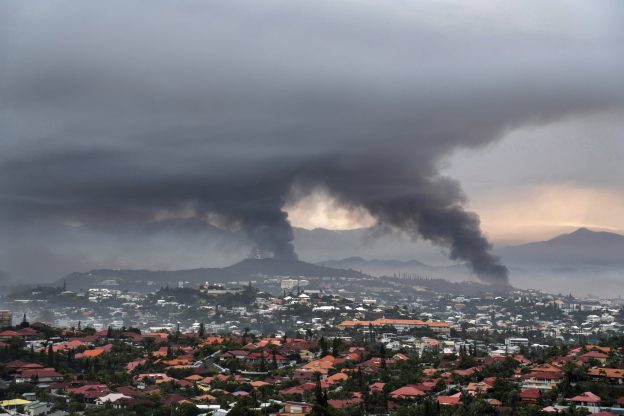On May 16th, a state of emergency descended upon New Caledonia, a French territory in the South Pacific. This drastic measure empowered the French government with sweeping tools to quell the violent unrest that had gripped the island. The unrest, reminiscent of the turbulent 1980s when the island wrestled with independence aspirations, stemmed from a simmering discontent with proposed electoral reforms.
Indigenous Kanak communities, who make up roughly 40% of New Caledonia’s population, view these reforms with deep suspicion. They fear the changes will dilute their political influence and ultimately serve as a mechanism for France to tighten its control over the territory. This concern speaks to a long history of colonialism, where indigenous voices were often marginalized. It is a hypocrisy of France, that the values to which they adhere to like equality, liberty, freedom of expression are curtailed by them on others for their own interest.
New Caledonia, a jewel in the turquoise waters of the South Pacific with a rich indigenous Kanak culture, finds itself mired in violent unrest. This eruption of anger echoes the turmoil of the 1980s, when the island grappled with a near-civil war over its independence from France. The current unrest centers on proposed changes to the electoral system, a move seen by the Kanak population as a deliberate attempt to weaken their political voice.
The violence has left a trail of destruction in its wake. Nouméa, the capital city, bears the brunt of the turmoil, with widespread looting and vandalism causing an estimated 200 million euros in damages. The human cost is even more stark, with five lives lost, including members of both the security forces and the Kanak community.
In a desperate attempt to quell the escalating violence that had gripped New Caledonia, the French government enacted a state of emergency in May. This drastic measure saw international flights grounded and curfews imposed upon the restive island. While these measures aimed to restore order on the surface, they merely addressed the immediate symptom rather than the underlying disease.
The roots of the unrest run far deeper than the recently proposed electoral changes. The simmering discontent stems from a history of failed independence referendums. Pro-independence groups, particularly those representing the indigenous Kanak population, fiercely contest the legitimacy of the 2021 referendum. They allege that the process was marred by flaws, leading them to boycott the vote altogether. This deep distrust in the referendum process has created a critical precondition for any future discussions on electoral reform. Pro-independence factions are adamant that the issue of the 2021 referendum must be addressed and resolved before they even consider engaging in talks about changes to the voting system. This stance highlights the deep-seated sense of alienation and disenfranchisement felt by the Kanak people, who see the proposed electoral reforms as yet another attempt by France to maintain its grip on the territory.
On the other hand, France and pro-unity factions in New Caledonia maintain that the referendums were conducted fairly. They advocate for reforms to the Nouméa Accord, the agreement that established the territory’s current framework of self-government. This includes changes to the electoral system, which they believe would create a more balanced political landscape.
France’s actions often seem contradictory when compared to the values they champion, such as equality, liberty, and freedom of expression, as they frequently impose restrictions on others to serve their own interests. This paradox underscores a broader pattern where nations prioritize their self-interests over the principles they profess to uphold. Such inconsistencies in behavior can erode trust and credibility on the global stage, potentially undermining efforts to foster cooperation and solidarity among nations. Additionally, they highlight the complex interplay between national interests, ethical considerations, and geopolitical realities in shaping international relations. As countries navigate these complexities, maintaining consistency between their actions and stated values becomes essential to uphold their credibility and moral authority in the eyes of the international community.
The declaration of a state of emergency underscores the severity of the situation. Curfews were imposed, international flights grounded, and security forces granted heightened authority. This dramatic step highlights the deep-seated tensions surrounding issues of governance and autonomy in New Caledonia. The island’s future hinges on finding a way to reconcile the aspirations of its indigenous population with France’s vision for the territory. Can a path be forged that respects Kanak representation and fosters a sense of genuine self-governance within the framework of French sovereignty? Or will the island remain trapped in a cycle of unrest, a testament to unresolved colonial legacies?







